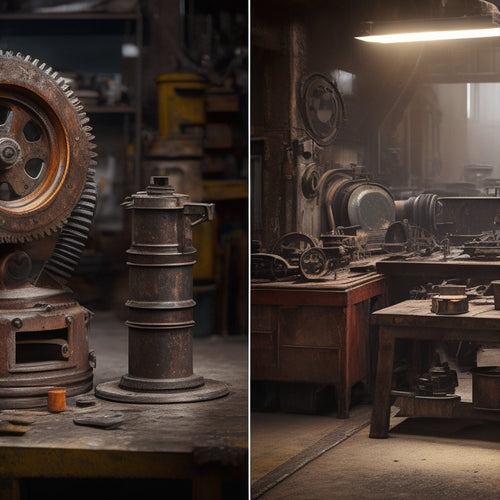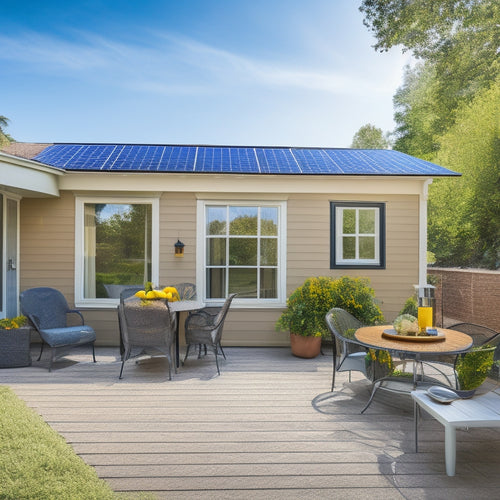
What Are the Benefits of an Off-Grid Solar System
Share
By investing in an off-grid solar system, you'll enjoy energy independence, guaranteeing on-site power generation and consistent energy flow during outages or disasters. Your electricity bills will considerably decrease, with potential monthly savings ranging from $50 to $250, depending on system size and energy usage. Additionally, you'll minimize your environmental impact, reduce your reliance on fossil fuels, and promote a sustainable lifestyle. Plus, your property value will increase, making your home more attractive to eco-friendly buyers. And, with minimal upkeep required, you can reap these benefits for years to come - investigate the specifics of how an off-grid solar system can work for you.
Key Takeaways
- Off-grid solar systems provide energy independence, ensuring a consistent power supply during outages or disasters.
- They significantly reduce electricity bills, with potential monthly savings ranging from $50 to $250 or more.
- Off-grid systems minimize environmental impact by reducing reliance on fossil fuels and generating clean energy on-site.
- They increase property value, making homes more attractive to eco-friendly buyers and potentially selling for up to 17% more.
- These systems require minimal maintenance, with solar panels lasting 25-30 years and occasional cleaning ensuring peak energy production.
Energy Independence Assured
Most households rely heavily on the grid for their energy needs, which can be unreliable and expensive. By installing an off-grid solar system, you'll break free from this dependence and guarantee your energy independence. This means you'll no longer be at the mercy of power outages or rate hikes.
With an off-grid solar system, you'll have energy security, knowing that your power is generated on-site and stored in batteries for later use. This setup guarantees system reliability, providing you with a consistent flow of energy even during grid outages or natural disasters.
You'll have the power to live life on your own terms, without worrying about the grid's limitations. In addition, an off-grid solar system allows you to customize your energy setup to meet your specific needs.
You can design a system that provides the perfect amount of power for your home, farm, or business, giving you complete control over your energy usage. By going off-grid, you'll experience the freedom and peace of mind that comes with being energy independent.
Reduced Electricity Bills
As you break free from the grid's limitations, you'll start to reap the financial benefits of an off-grid solar system. One of the most significant advantages is the reduction in your electricity bills. With an off-grid solar system, you're generating your own power, which means you're no longer reliant on the grid to keep your lights on.
The amount you save will depend on various factors, including the size of your system, your energy usage, and the solar panel efficiency. However, with an off-grid solar system, you can expect to see significant cost savings. Here's a breakdown of potential savings:
| System Size | Daily Energy Usage | Monthly Savings |
|---|---|---|
| 2 kW | 30 kWh | $50-$75 |
| 3 kW | 45 kWh | $75-$100 |
| 4 kW | 60 kWh | $100-$150 |
| 5 kW | 75 kWh | $150-$200 |
| 6 kW | 90 kWh | $200-$250 |
As you can see, the larger your system, the more you'll save on your electricity bills. With an off-grid solar system, you'll be utilizing the power of the sun to generate your own energy, and that means significant cost savings over time.
Environmental Impact Minimized
Frequently, homeowners who shift to an off-grid solar system find themselves not only saving money but also greatly minimizing their environmental impact.
By utilizing renewable energy from the sun, you're markedly reducing your reliance on fossil fuels, which are major contributors to greenhouse gas emissions. This means your carbon footprint is drastically reduced, allowing you to live a more sustainable lifestyle.
With an off-grid solar system, you're generating clean energy on-site, eliminating the need for transmission lines and reducing energy losses associated with traditional grid-tied systems.
This decentralized approach to energy production also reduces your dependency on the grid, making you less susceptible to power outages and grid failures.
Increased Property Value
Installing an off-grid solar system can greatly enhance your property's value, often resulting in a substantial return on investment.
This improvement in property appeal stems from the system's ability to provide clean, renewable energy and reduce reliance on the grid. As a result, your property becomes more attractive to potential buyers who prioritize sustainability and energy independence.
With the growing market demand for eco-friendly homes, an off-grid solar system can be a major selling point, setting your property apart from others in the market. In fact, studies have shown that homes with solar panels can sell for up to 17% more than similar homes without them.
Low Maintenance Required
Your off-grid solar system requires minimal upkeep, freeing you from the burden of constant maintenance. This is because solar panels are designed to last for decades, with an average lifespan of 25-30 years. During this time, they'll require only occasional cleaning to guarantee peak energy production.
Additionally, the lack of moving parts in your off-grid system means there's less chance of mechanical failure, reducing the need for repairs and replacements.
The installation efficiency of your off-grid solar system also contributes to its low maintenance requirements. A well-designed system is built to withstand various environmental conditions, including extreme temperatures, humidity, and weather events.
This means you can enjoy uninterrupted power supply without worrying about frequent system checks or repairs. As a result, your off-grid solar system can operate at peak performance for years to come, assuring system longevity and minimizing the need for maintenance.
With an off-grid solar system, you can have peace of mind, knowing that your power generation is reliable, efficient, and hassle-free.
Frequently Asked Questions
Can I Use an Off-Grid Solar System for My Entire House?
You're "barking up the right tree" if you think an off-grid solar system can power your entire house! With a system capacity that matches your energy needs, you'll achieve energy independence, relying solely on renewable energy and slashing your utility bills.
How Long Do Off-Grid Solar System Batteries Typically Last?
You'll find that off-grid solar system batteries typically last around 5-15 years, depending on factors like depth of discharge, temperature, and maintenance requirements, such as regular watering and equalization charging, which you'll need to perform to maximize their battery lifespan.
Are Off-Grid Solar Systems Affected by Extreme Weather?
You'll be surprised to know that 75% of solar panels can withstand Category 4 hurricane-force winds! When it comes to extreme weather, your off-grid solar system's durability is put to the test, but its weather resilience guarantees consistent power generation despite harsh conditions.
Can I Sell Excess Energy Back to the Grid With an Off-Grid System?
You can't sell excess energy back to the grid with a traditional off-grid system, but you can investigate net metering options or invest in energy storage solutions to optimize your self-sufficiency and maximize your renewable energy output.
Do I Need a Special Permit to Install an Off-Grid Solar System?
You'll need to check with your local authorities to determine if a special permit is required for your off-grid solar system installation, as installation requirements and local regulations vary, and it is crucial to comply with them to avoid any issues.
Related Posts
-

Why Higher Upfront Costs Are Worth It
You pay a premium for high-quality, energy-efficient products, but they're worth it. With durability testing ensuring...
-

10 Tips to Buy Affordable Solar Panels Online
When purchasing affordable solar panels online, you'll want to research reputable retailers, compare prices, and chec...
-

10 Tips for Cleaner City Air With Scooters
By adopting a few simple habits, you can make a significant impact on reducing city air pollution with your scooter. ...


